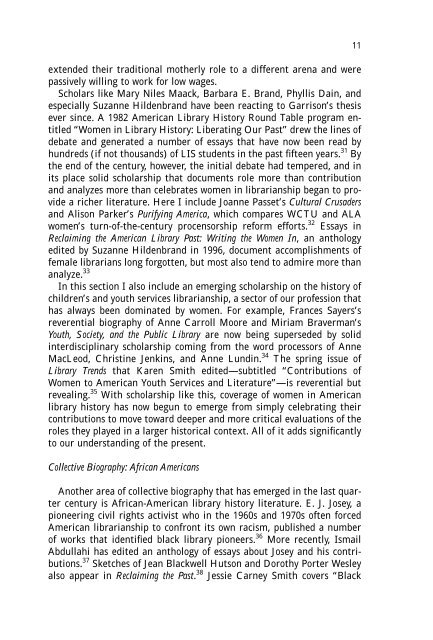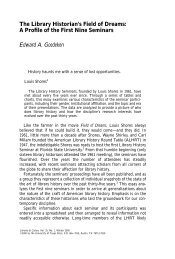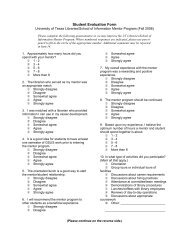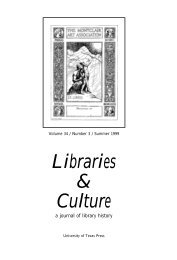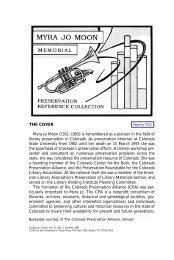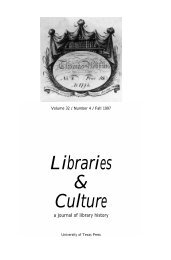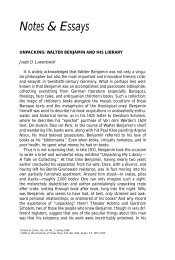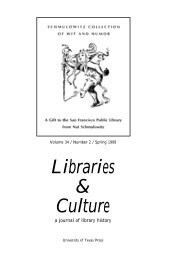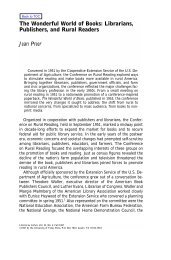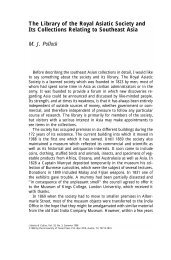Full issue (pdf file, 973 kb) - School of Information - The University of ...
Full issue (pdf file, 973 kb) - School of Information - The University of ...
Full issue (pdf file, 973 kb) - School of Information - The University of ...
Create successful ePaper yourself
Turn your PDF publications into a flip-book with our unique Google optimized e-Paper software.
extended their traditional motherly role to a different arena and were<br />
passively willing to work for low wages.<br />
Scholars like Mary Niles Maack, Barbara E. Brand, Phyllis Dain, and<br />
especially Suzanne Hildenbrand have been reacting to Garrison’s thesis<br />
ever since. A 1982 American Library History Round Table program entitled<br />
“Women in Library History: Liberating Our Past” drew the lines <strong>of</strong><br />
debate and generated a number <strong>of</strong> essays that have now been read by<br />
hundreds (if not thousands) <strong>of</strong> LIS students in the past fifteen years. 31 By<br />
the end <strong>of</strong> the century, however, the initial debate had tempered, and in<br />
its place solid scholarship that documents role more than contribution<br />
and analyzes more than celebrates women in librarianship began to provide<br />
a richer literature. Here I include Joanne Passet’s Cultural Crusaders<br />
and Alison Parker’s Purifying America, which compares WCTU and ALA<br />
women’s turn-<strong>of</strong>-the-century procensorship reform efforts. 32 Essays in<br />
Reclaiming the American Library Past: Writing the Women In, an anthology<br />
edited by Suzanne Hildenbrand in 1996, document accomplishments <strong>of</strong><br />
female librarians long forgotten, but most also tend to admire more than<br />
analyze. 33<br />
In this section I also include an emerging scholarship on the history <strong>of</strong><br />
children’s and youth services librarianship, a sector <strong>of</strong> our pr<strong>of</strong>ession that<br />
has always been dominated by women. For example, Frances Sayers’s<br />
reverential biography <strong>of</strong> Anne Carroll Moore and Miriam Braverman’s<br />
Youth, Society, and the Public Library are now being superseded by solid<br />
interdisciplinary scholarship coming from the word processors <strong>of</strong> Anne<br />
MacLeod, Christine Jenkins, and Anne Lundin. 34 <strong>The</strong> spring <strong>issue</strong> <strong>of</strong><br />
Library Trends that Karen Smith edited—subtitled “Contributions <strong>of</strong><br />
Women to American Youth Services and Literature”—is reverential but<br />
revealing. 35 With scholarship like this, coverage <strong>of</strong> women in American<br />
library history has now begun to emerge from simply celebrating their<br />
contributions to move toward deeper and more critical evaluations <strong>of</strong> the<br />
roles they played in a larger historical context. All <strong>of</strong> it adds significantly<br />
to our understanding <strong>of</strong> the present.<br />
Collective Biography: African Americans<br />
Another area <strong>of</strong> collective biography that has emerged in the last quarter<br />
century is African-American library history literature. E. J. Josey, a<br />
pioneering civil rights activist who in the 1960s and 1970s <strong>of</strong>ten forced<br />
American librarianship to confront its own racism, published a number<br />
<strong>of</strong> works that identified black library pioneers. 36 More recently, Ismail<br />
Abdullahi has edited an anthology <strong>of</strong> essays about Josey and his contributions.<br />
37 Sketches <strong>of</strong> Jean Blackwell Hutson and Dorothy Porter Wesley<br />
also appear in Reclaiming the Past. 38 Jessie Carney Smith covers “Black<br />
11


